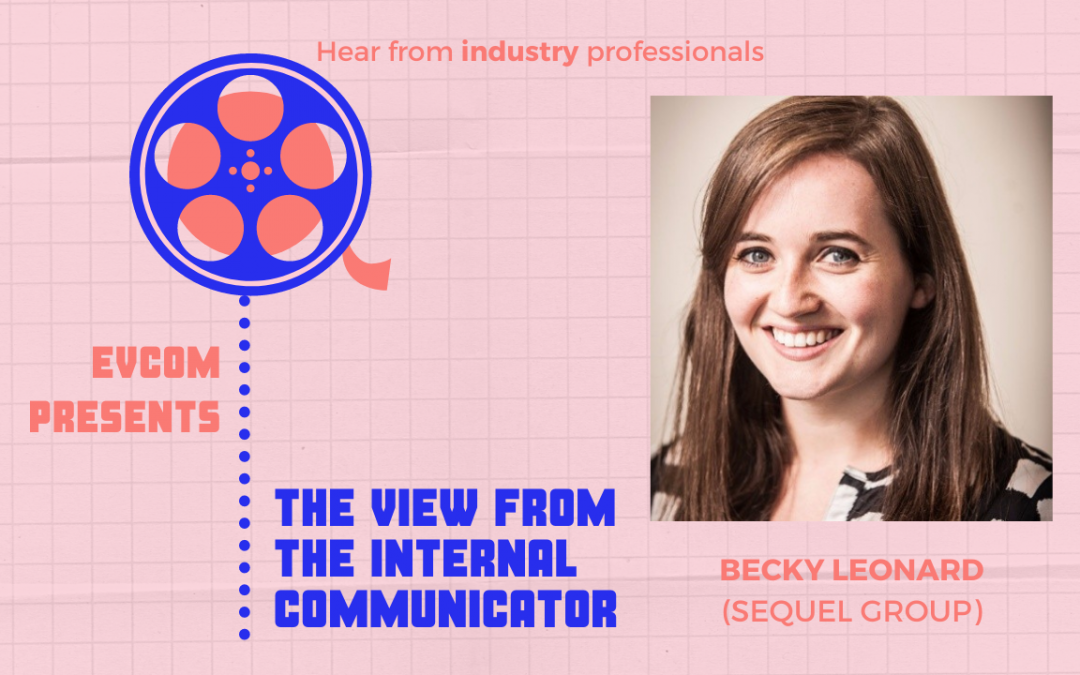We speak to Becky Leonard (Internal Communications Specialist, Sequel Group). Becky works in internal communication, helping organisations connect and communicate with their employees – including through film and events. She explains what internal communication is and why it’s a great career to consider.
Firstly, what is internal communication?
Internal communication is reading a company email. It’s a conversation with your manager. It’s posting on your company social media. It’s attending a workplace event.
Put simply, internal communication is the communication that happens within a company between colleagues at every level. It helps employees understand what’s happening within an organisation, what their role is in the bigger picture, and how they can contribute to its success.
Tell us a bit about your role.
I work for Sequel Group, an award-winning employee experience agency, as the Insight and Content Manager. Although we’re based in London, we get the chance to help organisations all over the world with their internal communication and employee engagement initiatives. That might be through insight (such as research and measurement), content (such as writing, design and video), or technology (such as websites and apps).
Part of my role is being a content specialist, helping clients get messages to their employees. This might be writing copy for campaigns, articles for magazines, blogs for online or scripts for corporate film. And the other part is acting as a strategic advisor. I use our knowledge of communications best practice and industry trends to advise clients on the best way to communicate within their organisation.
What do you wish you’d known when starting out in the industry? What advice would you give to young people starting out in the industry now?
I don’t think people are aware just how many opportunities there are in internal communication. For example, I work in an agency, but you can also work in an internal communication team within an organisation or freelance on ad-hoc projects for different clients.
And it also goes beyond the traditional ‘communication manager’. There are lots of different roles to explore. You can be a film producer and/or director. You can manage and run internal company events. You can design and create multimedia content and campaigns.
For those readers still considering whether this industry is the right place for them, tell us what you most love about it. What appealed to you about this industry?
It’s a cliché but no day is the same. You get to collaborate with a variety of people, on any and every topic important to your employee audience. From championing mental health to supporting climate change initiatives, no topic is off limits. And you can work your creative muscles to come up with new ideas and solutions to keep things fresh.
Our agency’s video team works on film and animation, on short and long-form videos, for charities and global corporates, with a professional crew and equipment, and even with footage filmed by someone on their phone. From the likes of PZ Cussons to Nationwide to Bupa, you can see some of the kinds of films we produce here.
Can you recommend one resource for young people starting in the industry to check out?
If you’re interested in the world of internal communication, check out the Institute of Internal Communication’s (IoIC) FutureNet. The network supports industry newcomers and the development of future leaders.
Plus I co-wrote an IC Career Guide for FutureNet, which has more detail about how to get into a career in internal comms. You can download it here.
The IoIC is internal communication professionals’ answer to EVCOM – a professional body dedicated to promoting and developing the internal comms community. You’ll need to be a member to access the IoIC’s full library (and its online publication, Voice) but there’s still several insightful blogs open for anyone to read.
Find out more about Sequel Group here:


